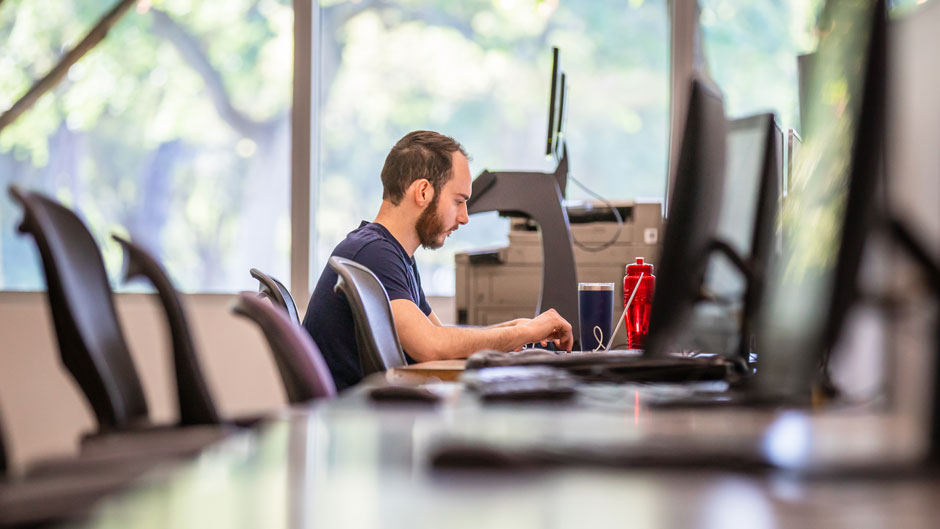Today the spring semester at the University of Miami comes to a close, and students across campus can almost breathe a sigh of relief. Though this is the final day of classes for students, many are still gearing up for final exams, which begin on Wednesday.
While deadlines and exams can induce increased stress levels, here are a few pieces of advice and a list of resources that are available on campus to help students excel during the final stretch of the spring semester.
Maintain a healthy sleep schedule.
During finals week, pulling an “all-nighter” to maximize studying time might be tempting. But research shows that getting a full night’s rest is more significant and beneficial for your memory than an extra hour of studying, said Aidan Wells, a health educator with the Department of Wellness and Recreation.
“Figuring out how to get adequate sleep during finals week is a stressor in and of itself,” she said. “Lack of sleep can impact the function of your body, which leads to brain fog, slow brain function, and results in students retaining less information.”
Sacrificing sleep can also result in a weakened immune system, she added. Wells suggests maintaining seven to nine hours of sleep a night and eliminating the use of blue-light emitting devices for up to 30 minutes before falling asleep.
“Take time off from devices before resting. Try reading a book and avoid focusing on additional stressors when unwinding at night.”
Practice self-compassion.
“A lot of times, people can see their anxiety or guilt as motivation. Self-compassion allows you to see the stress, accept it, and feel nourished enough to move past it,” said Laura Adams, a clinical psychology doctoral student and intern with the Counseling Center.
Adams explained that there are three steps to practicing self-compassion during stressful moments. First, she encourages students to be mindful of the present moment.
“It sounds counterintuitive, but tune in to your suffering, notice it, and make it bigger, and allow it to wash over you,” she said. Accepting and understanding a stressor with sympathy and kindness allows you to overcome the anxiety surrounding the feeling more easily. Next, identify the common humanity in the situation.
“Stress can make us feel very isolated, especially when students think they’re spending so much time studying,” Adams said. “Acknowledging that everybody has felt these feelings and that every student is likely feeling these feelings, we can bring in this ‘We’re all in this together’ mentality to help lower stress levels.”
And finally, practice self-kindness. Our willingness to observe our negative thoughts and emotions with openness and clarity, without trying to suppress or deny them, helps us feel compassion for ourselves.
“Think about what you need to hear at this moment and how you can bring in kindness toward yourself,” Adams said. “Students can remind themselves that they’ve given this semester, or this course, everything they can.”
Take care of your body.
Even just a few minutes of physical activity can keep your mind sharp, Adams and Wells both agreed.
“Sometimes, it’s as simple as standing up and walking around the building you’re studying in to give yourself a moment to pause,” Adams said.
Beyond going for a walk, practicing a variety of low-intensity yoga or vigorous cardio exercises can reduce levels of stress and anxiety. Attend a mindful meditation class, yoga session, or group exercise class at the Patti and Allen Herbert Wellness Center, which is free and open to all students.
“Our class schedules are flexible and designed to fit the schedule of an active student. I recommend our mindful yoga course that offers mindfulness techniques to help mitigate stress,” Wells said. In addition to adequate sleep and exercise, she added that maintaining a healthy and balanced diet is crucial to supporting brain function to succeed in exams.
Indulge in stress-relief activity on campus.
If you’re looking to take a quick break from studying on campus, squeeze a stress ball, relax with crayons and coloring sheets, or even pet a therapy dog, all of which are available at the University Libraries—particularly, the Access Services in Richter Library, Weeks Music Library, and the Architecture Research Center during the final exams period.
“Activities like pet therapy and mindfulness offer opportunities for healing connection and relaxation,” said Kelly Miller, associate dean for learning and research services at Richter Library. “Learning how to calm our nervous systems and gain perspective during stressful times is critical to success in our challenging world.”
Students can also take a moment to decompress from studying for finals and enjoy a tasty treat, de-stress activities, and more during Unwind from the Grind at noon on Tuesday, May 3, on the Lakeside Patio.
Additional resources for students:
- Academic Resources
- ’Canes Care for ’Canes
- Counseling Center
- Dining Options (May 2 through May 15)
- Libraries
- Wellness and Recreation

